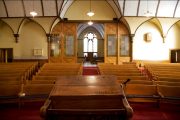
Residents of Evanston, Illinois took part in the city’s Juneteenth parade Saturday, but some have been left wondering why July 4 celebrations have been canceled.
The city celebrated Juneteenth, the new federal holiday commemorating “the end of slavery” in the United States, holding a parade and a community gathering that featured live performances, art displays, and food vendors.
Evanston Round Table reports: “Presented by Evanston Present and Future in partnership with the City of Evanston, Evanston’s Juneteenth commemoration continued with a celebration lineup that included speakers, muralists, musical and spoken word performances, drumming, poetry, and dance…. Hundreds of Evanston residents and visitors joined the parade in cars and on foot, and hundreds more cheered them on from sidewalks, parkways, and front porches.” Evanston Mayor Daniel Biss was spotted mingling with residents and was seen participating in a car parade.
Kemone Hendricks, founder of education and scholarship organization Evanston Present and Future as well as Evanston’s Juneteenth Parade, has been organizing a Juneteenth celebration in Evanston for the last three years. “I organized it because Juneteenth is America’s real Independence Day and America’s real Freedom Day,” said Hendricks.
State Representative La Shawn Ford began pushing for Juneteenth to become a state holiday in 2019. This spring, he found the support he needed, as the Illinois House and Senate voted in May to approve the move. “George Floyd’s killing opened the eyes, minds and hearts of my colleagues. And that means the white and Hispanic colleagues to the struggles of Black people in America,” said Ford.
On June 16, Illinois governor J.B. Pritzker recognized Juneteenth a state holiday.
The partying will resume next Saturday, when Evanston hosts its annual Pride celebration, including a car parade, a community picnic, and an evening candle-lighting ceremony. The event theme is “Proud to Be,” which organizers say will celebrate “the deep intersectionality of the LGBTQIA+ community with other marginalized communities.”
In the light of the preparation for the “woke” festivities, some residents felt frustrated over the Evanston Fourth of July Association voting earlier this year to cancel the town’s Independence Day events and opt for a virtual celebration instead, citing concerns over the ongoing coronavirus pandemic.
“Based on concern for public health due to the unpredictability of the pandemic’s impact, vaccination rates, and in cooperation with our local authorities, the Trustees … voted to cancel the Fun Run, Parade, Palatine Concert Band performance and Lakefront Fireworks show on July 4, 2021,” the board wrote in a statement.
Even as COVID-19 cases plummeted in Evanston, the board stood its ground and defended its decision to cancel festivities. The board members argued they were limited by time restraints and an unclear future during the pandemic.
“We made the decision in March based on the information that we had at that time,” Trustee and Celebration Manager Jamie Black explained. “There are deadlines for permits and to secure the fireworks, as well as taking applications for the parade that happen early in the year.”
“We erred on the side of caution. If things weren’t better, we would have been criticized for being a super spreader event,” he added.
Reportedly, COVID-19 is no longer a concern for residents of Evanston. Last week, the city recorded no new cases for the first time since the outbreak began. Information put out by the city shows that almost 87 percent of residents who are 12 years old and older have been given at least a single dose of a COVID-19 vaccine.
Evanston made headlines recently by becoming the first city in the country to pay “reparations” to Black residents who lived there between 1919 and 1967, or who were descended from someone who did, and who “had been a victim of discrimination in housing because of policies or practices in the city in that time.” $400,000 will be distributed to eligible black households. Each qualifying household would receive $25,000 for home repairs or down payments on property. The program is being funded through donations and revenue from a three-percent tax on the sale of recreational marijuana. The city has pledged to distribute $10 million over 10 years.
More than 90 percent of Evanston residents voted Democrat in the 2020 presidential election. The Chicago suburb has consistently ranked among the “best cities to live for liberals,” as assessed by Livability.com, which praised its “college-town vibe” and cultural diversity. That “diversity,” however, gives little place for American patriots.





